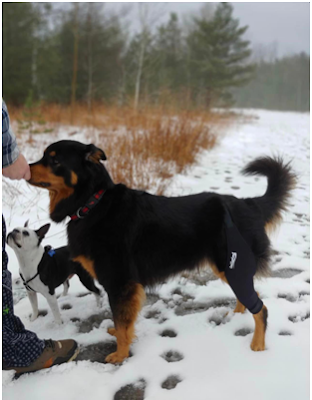Unraveling the truth about Dog Knee Braces
It's critical to distinguish fact from fantasy when discussing the
welfare of our furry pets. The topic of dog knee braces is one where myths
frequently surface. The usage of these assistive gadgets has unfortunately been
clouded by a number of misconceptions over the past few years despite their
rising popularity. We want to dispel these myths and highlight the real
advantages of knee braces for dogs in this blog post.
Myth vs. Reality: The Benefits of Knee Braces for Dogs
Misconception 1: Knee braces are only for older dogs.
Reality: One of the most common misconceptions about knee braces for dogs is that they are only suitable for older or senior dogs. However, knee braces can benefit dogs of all ages. Younger dogs may experience knee injuries due to excessive play or jumping, while older dogs may develop arthritis or suffer from joint pain. Knee braces provide stability, support, and pain relief for dogs across the age spectrum, helping them lead active and comfortable lives.
Misconception 2: Knee braces hinder a dog's mobility.
Reality: Some pet owners are concerned that knee braces may limit their dog's mobility, causing discomfort or possibly more damage. Modern canine knee braces, however, are made with mobility in mind. They are thin, adaptable, and adjustable to provide a cozy fit. These braces are designed precisely to support the knee joint without obstructing normal motion. Knee braces, when placed correctly, can actually improve a dog's mobility by supplying stability and easing pain, allowing them to resume their favorite pastimes.
Misconception 3: Knee braces are only a temporary solution.
Another common myth is that knee braces can only offer short-term
relief and cannot offer long-term treatment. This is untrue. While it's true
that some knee issues may necessitate surgical treatment, knee braces can be
quite helpful throughout the recovery period and in the long-term management of
specific conditions. They can assist in promoting healing, reducing
inflammation, and stabilizing the knee joint. A dog's quality of life can
frequently be considerably enhanced by knee braces without the need for
intrusive operations.
The Importance of Consulting a Veterinarian for Proper Diagnosis and Brace Selection
It's crucial to speak with a veterinarian before considering using a knee brace on your pet. To identify the underlying cause of the knee issue and make sure the right brace is chosen, a professional evaluation is required. Veterinarians are qualified to identify the precise condition and suggest the best course of action, which may entail using a knee brace.
Conclusion:
We can provide a greater knowledge of the advantages and effectiveness of dog knee braces by dispelling common misunderstandings about them. Canines of any age can benefit from these braces; they are not just for elderly dogs. Depending on the particular situation, they can be used as both short-term and long-term remedies because they are made to support mobility rather than hinder it. Always visit a veterinarian to ensure correct diagnosis and treatment before deciding on a knee brace for your dog. Knee braces can be a useful tool in boosting your animal friend's health and happiness with the appropriate information and direction.






